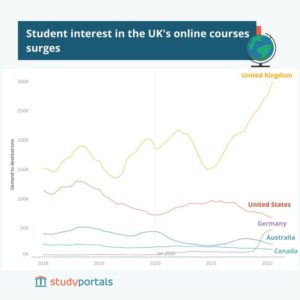Vivienne Stern: Why the UK is leading the online space
While the outbreak of COVID-19 has accelerated the development of online education in Higher Education institutions across the world, it seems the UK is leading the way in the online space. No other region is as dominant as the UK, in capturing the interest of international students.
Studyportals Senior Editor Cara Skikne spoke to Vivienne Stern, Director at Universities UK International to discuss the possible reasons why the UK is leading the pack, the future of online education, and the role of online education in expanding access to education.
 |
 |
Online Education in the UK
Data from Studyportals dashboard shows a huge surge in student interest for online programmes in the UK.
When it comes to what sets UK universities apart, Stern thinks that their strong reputation for quality is part of the reason behind the high level of interest in their online programmes. She also thinks that the universities have done a good job of communicating what online means.
Moreover, the general attitude amongst students towards online learning tends to be positive despite the surrounding debates that remain at the political level: “Students can see the advantages of the flexibility that comes with online learning and the opportunity to learn at their own pace.”
Stern says she often hears about students who listen to their lectures at differing speeds. Additionally, the flexibility that comes with online learning also means that students have the freedom to create their schedule and study on their own time. “They may not be early birds, but they can catch the lecture later in the day and listen to it again when they’re revising.”
She adds: “There may be things that students are responding to because they can see how that’s going to help them get a better degree.”
The future of online education
Early on in the pandemic, it was clear that there were some countries that just weren’t interested in online learning: “We were being told that if it was online, people wouldn’t come, and that didn’t turn out to be the case.”
In fact, she says, towards the end of the pandemic there was real demand for a continuation of full online programmes. “So I think we’ve been through this fascinating period and I guess the question is what are going to be lasting effects.”
Although it is still unclear as to what the future will hold for online education, Stern thinks that these new modes of learning will continue to persist even after the pandemic.
She believes that online education had already been gaining momentum as part of Transnational education (TNE) offerings before the pandemic and that it will continue to be a key component of TNE: “Universities are going to have to have some kind of sharp online offering if they want to compete in the TNE space.”
“I think the ability of universities to deliver this kind of online provision that quality will be a lasting positive legacy of the crisis.”
A shift in the way employers see online courses
Before COVID-19, there had always been a lot of reluctance surrounding how online degrees are viewed by employers. Online learning was often considered to be less respected and inferior to traditional, on-campus programmes. But Stern thinks that this is now starting to change: “Every single employer has had to shift some of their business interactions online, so it kind of breaks down the idea that online is passive and not interactive”.
She says: “I think we have been demystifying online and getting away from the idea that when people talk about online, they’re talking about a form of mass education that’s totally unresponsive, not interactive and not personalised. And that’s not what it has been at all.”
Expanding Access to Education
The potential of online education to reach students in underserved areas around the world looks promising: “The one thing I would say is I think there’s a there’s fantastic opportunity to expand access”.
Delivering online education is not necessarily cheaper, but it’s scalable in a way that face to face is not: “It offers opportunities to deliver education to people who wouldn’t be able to afford to travel for study. And I think that’s really important. I think we should hold on to that.”, says Stern.
She adds: “All universities have permission to widen access and I think we were pretty good at that domestically, but we’re not very good at it internationally.”
Stern also thinks that the new interest in online is coming from a new type of student who may not have signed up for in-person learning: “I suspect there are lots of people who would be able to return to education for whom online study is a real opportunity they might not have in the past”.
The development and subsequent acceptance of online learning seem to have come at the right time when life-long learning is increasingly gaining importance in the face of our rapidly changing world: “In the longer term, we’re going to get an opportunity to develop lifelong opportunities for learning in a way that I think hasn’t really been available in the UK.”
For more updates, follow us!





